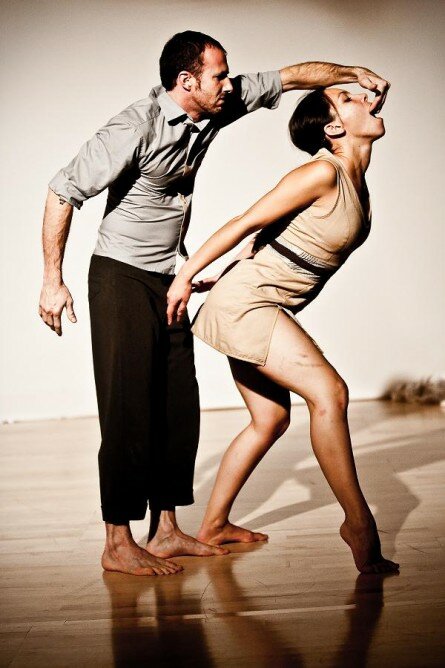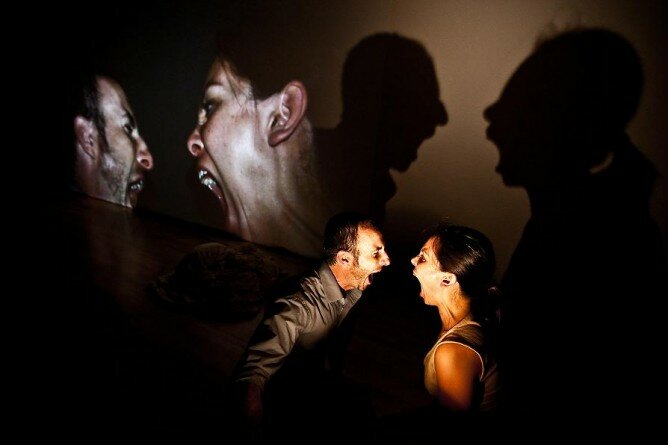Portland Duo tEEth is a “Music-Generating Movement Monster”
In mid-April, I drove down to Portland with a friend to meet with choreographer Angelle Hebert and composer Phillip Kraft, better known as tEEth, hours before their benefit performance for their upcoming tour of Home Made, an excerpt of which they brought to The A.W.A.R.D. Show! in January, which ultimately won the competition. The four of us settled into a corner table for some warm drinks at the charming Vivo Espresso, around the corner from the duo’s space, the mOuth (reminiscent of Velocity’s Founders Theater).
The two met in Salt Lake City, where Phillip is from and Angelle went to school, and upon moving to Portland in 2002, began collaborating and eventually founded the company in 2006. When asked about the traces of “tEEthdom” in their early work, Angelle replied, “I guess I did this gesture where I pulled my brain out at one point,” she laughed, as she curled her hand into a sort of claw and circled her head, pulling outward.
But it was one evening in Minneapolis, during a six- or seven-hour living room improvising session, that they had their artistic breakthrough, Angelle told me. “The seed was planted in different parts of our bodies in that one night, and we’re still pulling up the roots of all that.” Phillip adds, “And I don’t think we’ve actually told that story until this last show”—Home Made, a story ten years in the making.
The flow of responses between the couple was much like how the sound and movement interact in their work—with seamless transitions, as thoughts traveling between two heads of a “music-generating movement monster,” as they jokingly called themselves. Their generative process is so interwoven that when improvising, Angelle mentions, “sometimes I don’t know if it’s my voice making the sound or it’s his voice making the sound.”

Noel Plemmons and Keely McIntyre in Home Made. (Photo: Aaron Rogosin)
Home Made is a duet between dancers Keely McIntyre and Noel Plemmons and at times feature a live feed camera which the dancers handle themselves, projecting close-ups and intimate moments on the wall behind them. The dancers also handle a microphone during some sections contributing to the live vocal soundscape, though the majority of the vocals are performed by vocalists Luke Matter and Cali Ricks who stand on the periphery of the stage.
Angelle and Phillip don’t usually perform in their pieces. “Well,” Angelle recalls, affirming the melded nature of the partnership, “we’ve done solo work together… solo as in duet.”
Being in Portland has enabled them to have a space of their own and even to buy a house. It’s a place Angelle describes as livable and urban, but not overwhelmingly so. At first they made their work edgier and more aggressive, Phillip said, in order to stand out in Portland, but that might be softening a little with this piece.
“[It's] is our journey as collaborators and as lovers, and being married, and all the complications that come with that,” Angelle told me. The couple found themselves in the midst of what’s commonly known as the seven-year itch, and “our way to work through the muck of it,” she continues, “was to go into the studio and improvise together. Ultimately we just came to a place where we wanted to put it on stage.”
They encountered vocalist Luke Matter when he was performing as a KJ (karaoke jockey). “Take Björk and then take her up an octave,” Phillip said of Matter’s vocals. Combine Matter’s wicked falsetto with Ricks’s choir boy tones (“Her voice on an EQ takes up this tiny little bandwidth”), and you get the woven and crystalline sounds that are the support for dancers McIntyre and Plemmons.
These two pairings on stage not only created a nice symmetry to the piece but become the forces that string it together. McIntyre and Plemmons’s already established dance partnership enabled Angelle to push her choreographic virtuosity, and for Phillip, working with professional vocalists (rather than just asking dancers to sing) enabled his composition to grow and deepen naturally. Ricks and Matter’s voices are sometimes supplanted by the electronically filtered roar of Angelle’s childhood dollhouse burning or Plemmons’s voice augmented with subtle effects to produce the wildest range of crying sounds you can imagine. The dancers use and abuse the microphone—Plemmons holds it between his legs or clutches it between his toes, producing a chimp-esque whimper, or holds it in McIntyre’s mouth as the audience endures her all-out scream. At one point I looked over and the vocalists were embracing, sharing a microphone—in their mouths.
The audience is constantly privy to the paradox of private and public in the piece. They witness the intimate world of a couple as it unfolds under a stage-sized white sheet via a live camera feed, while at the same time being shielded from the action (which can be described as ranging somewhere between tender and critical). The light from the camera over-exposes the dancers, yet the overall stage setting during these parts is dim and almost hides them. Despite the beneath-the-sheets honesty of these live-feed sequences, Angelle and Phillip say it’s the simplicity and stripped-down rawness of the piece that makes it so successful.
In response to a question about the abundance of nakedness, which they’re using for the first time in this piece, Angelle laughed. “I want to do everything naked,” she said. “You can just see the body so much easier. It just makes everything so much more clear—”
“—and human,” Phillip added. “Once your clothes are off, everything just kind of opens up.” Being naked might be more “human,” but such stark humanness can be unfamiliar to us. “It’s more alien to be completely naked than it is to have clothes on,” Angelle points out.
Aside from attention to the naked body, there’s emphasis on the ever-presence of the mouth, whether it’s a silent mutual scream, Plemmons steering McIntyre by her jawbone, McIntyre hanging on by Plemmons’s lower jaw or sucking on his chin, or the dancers speaking into each others’ pried-open mouths in forceful whispers.
With regards to the name tEEth, “I’ve experienced a lot of trauma with my mouth,” Angelle explained, pointing out her fake teeth in front. “Multiple surgeries, I’ve had root canals, I’ve had bridges, bone graphs—you name it. So it’s just a very vulnerable space for me.”
In improvising she tends to work a lot with facial expressions or using the mouth not only to make sound but as an impetus for movement. I’m reminded of the rhythmic, saliva-desperate section in Home Made when in tight coordination the dancers smack their own out-stretched tongues dry. There’s another moment of striking symmetry where they are balanced, each on one foot, as they move at the same time to kiss each other’s quad muscle, shoulder, and elbow—but McIntyre’s kiss suctions on, becoming a gaping goldfish slobber.
The mouth stands as a gateway for what comes out of the body—sound, fluid—but it also regulates what goes in. “It’s where you digest, you consume things—it’s that point of contact where you’re breaking things down,” Angelle said. And of course the reasons why they call themselves tEEth (and their studio “the mOuth”) continue to reveal themselves, like Home Made, over time.
When asked about long-term goals, Phillip was up front. “It would be great to be able to pay ourselves. You win $10,000, and it’s all of a sudden legit.”
“But actually,” Angelle continued the thought, “we’ve been doing this for a very long time, and…$10,000 has been spent. Like, many years ago.”
The A.W.A.R.D. Show! inspired them to hold auditions in Seattle to “bridge the gap” between Seattle and Portland, and they’ll be bringing in two Seattle dancers for their new piece, which will be about “trying to find what I’m really, honestly interested in,” said Phillip, which means not getting lost in the technology of it. For Angelle, it’s ultimately about “trying to express what we do in the studio together, because that is the truest, most honest place.”

Noel Plemmons and Keely McIntyre in Home Made. (Photo: Aaron Rogosin)
tEEth takes Home Made to Austin’s Fusebox for two more performances this Friday and Saturday, where Phillip says the crowd seems to be “younger and hungrier for this kind of work.” Then they’ll end the tour back to Salt Lake City, where they met, in October.
-
Volckening
-
http://culturebot.net/2011/06/10968/picas-tba-2011-fest-early-line-up-announced/ PICA’s TBA 2011 Fest Early Line-Up Announced | Culturebot

 Daily Email Digest of The SunBreak
Daily Email Digest of The SunBreak